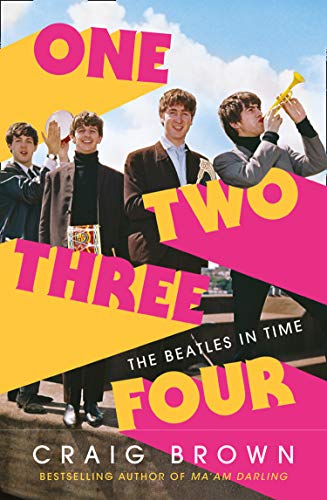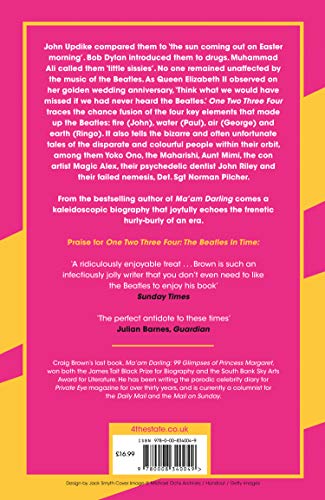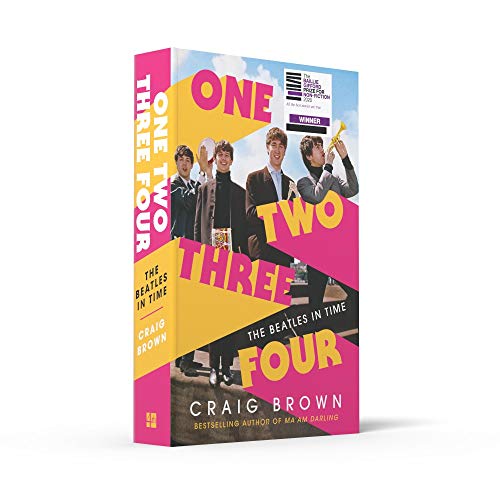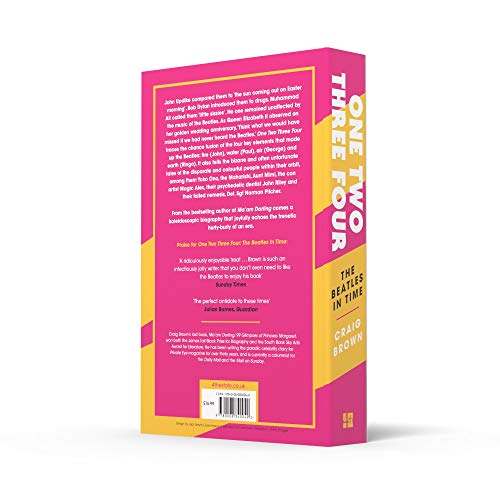




Fourth Estate One Two Three Four: The Beatles in Time
D**S
Enjoyable and Funny, but a Lot of Errors!
It's not easy to present the Beatles story from a fresh and different angle, but this book does it in a fascinating and funny way. I loved Brown's previous book on Princess Margaret, and this is just as enjoyable. However I also noticed a lot of careless mistakes in the text, so in the unlikely event that Craig Brown or his publishers read this, here are a few of them -p.65 - Brian Epstein's family business was North End Music Stores, not North East Music Stores.p.123 - The New York folk music venue was 'Cafe Wha?' not Cafe What.p.259 - Prime Minister Harold Wilson was not "a fellow Liverpudlian", he was from Huddersfield in Yorkshire.p.308 - John and Aunt Mimi lived in Woolton, not Walton.p.363 - The lyrics to Across the Universe are "Jai Guru Dev", not Jai Guru Deva.p.389 - The song It's Getting Better is not "set in school".p.451 - Across the Universe wasn't written in India.p.491 - Two different lines from Hey Jude are mixed up, so the point about mishearing the lyrics makes no sense.p.552 - Paul has a cigarette in his right hand on the Abbey Road cover, not his left hand.p.575 - "Marital virtues" should read martial virtues.
J**T
Let’s not Listen…
Most books about the ’60s are bright and bubbly affairs, full of “I was here” and “I was there” and “this was happening” and “that was happening”, and quite right, it really was, but the first hundred pages of One Two Three Four are a dour and depressing affair, flitting back and forth in very brief chapters of three to five-ish pages between author Craig Brown’s pilgrimage to various fake shrines and phoney nostalgia events in the present day to a slow methodical plod from the Cavern and Hamburg to the end of it, ‘it’ being the rise and fall of the greatest pop band of all time, the Beatles (or “the Peadles” as Brown repeatedly tells us the Germans call them—okay, boomer). The author specialises in snobbish but cruelly accurate satirical ‘diaries’ in Private Eye magazine and here turns his attention to some of the most important music of the 20th century.There have been many, many books on aspects of the Beatles of course, and one virtue of this late entry is that it is able to collect various versions of incidents from its predecessors and collate them together. Consequently, we get numerous versions of Lennon beating up a record company employee at Paul’s birthday party, all of which ‘dally with the truth’ but offer slightly alternate versions of the same violence, and all the assorted speculation of John’s holiday in Spain with the group’s gay manager, Brian Epstein. Did they, or didn’t they? Like many men aggressively virulent towards homosexuality, Lennon may have been firmly in the closet, and genuinely fearful of any curious feelings. Interestingly, not one account (by this account) appears to have considered the possibility that, in an era when holidays abroad were extremely rare for the British working class, he may just have naively accepted the invite from his hopeful boss for the experience of a foreign holiday in the sun, like some innocent office secretary accompanying her sneaky boss to Bournemouth or Eastbourne for a ‘conference’. In just a few short months, the Beatles would own the world, and indeed, for a year literally own several Greek islands they never bothered to visit.As the book starts, die-hard Beatles admirers will be even less amused than the frosty couple from the National Trust, who are sent up mercilessly for their attempts to stop the author cashing in on their own crass attempts to cash in. Brown not only hilariously ignores all their futile admonishments not to repeat their stories, he includes them *with* the stories. That there is a shabby Beatles heritage industry in full flow today is relentlessly hammered home in between time travels to the drab, dowdy Britain of the early 1960s. In my first sitting with this book, read over a week, I had been invited to wallow in the darkest aspects of Lennon and McCartney’s upbringing and adolescence, the squalor of Hamburg and its inadequate, disappointing sexual experiences with added thuggery and vomit, the traffic accident death of Lennon’s vibrant and sexy young mother, the betrayal and attempted suicide of Pete Best, the mockery of John’s marriage to the easily satisfied Cynthia, the possibility of gay hang-ups in the group in an era when homosexuality was scary, scornful, and illegal, and the bitter resentment of every other band in Britain. We all know that John Lennon was a deeply unpleasant and damaged person, and that Pete Best was cruelly dumped on from a great height, and for most of us, that is the extent to which we are prepared to deal with the dark side of a pop group who, when their bright, catchy music bursts forth, bring instant sunlight and happiness and, to those who lived during the period, wistful nostalgic delight. Nobody wants a whitewash, but surely there was the occasional upside, some good times? Brown’s talent for pinpointing and mocking the most pathetic and cruelly observed aspects of Britain in the ‘60s is ill-suited for fannish archaeology.By page 100, everything changes, and One Two Three Four becomes a different book. We learn again what everybody my age has known all our lives: in 1963, the Beatles smashed Britain, beginning the year with laughable local gigs that were the equivalent of barn dances and private parties, and ending it with Sunday Night at the London Palladium, the Albert Hall, and the Royal Variety Performance, the three biggest gigs in the country. In 1964, they smashed America and the world. And they deserved to, as artists, if not always as individuals. But would any other four young men have behaved in any other way? Too much, too soon? Not exactly, but a heavy load to carry at any age. It was like winning the lottery, but earning it.From hereon, the book is exhilarating. There are endless anecdotes, with Cliff Richard (still sulking years later), the Ronettes, future murderer Phil Spector (even then clearly deranged), creepy bumptious bully Ed Sullivan out of his depth, the publicity stunt with Mohammed Ali with all concerned worlds apart and reluctant to participate, the hypocrite Frank Sinatra doing a replay of his Elvis moment (nuclear contempt followed by shameless sucking up) and Bob Dylan fatefully introducing them to drugs. Other highlights are provided by the helpless haters, haplessly raging incoherently, spluttering in respected journals whose publishers are now surely embarrassed at what they printed, so brutally spiteful, silly, and out of touch were the reviews. Brown placidly digs it all up and mercilessly empties the shovel onto the table. Bad reviews for the blatantly brilliant are so much more fun than the more prescient ones; see also Elvis. And there are wonderful quotes from the other side of what was called ‘the generation gap’:“When I think about ‘She Loves You’ and how much I loved that song, how new it sounded, and how happy it made me feel to hear it, I think about how much it represented the mirage of a possible future, one that was more joyful and more interesting than my lonely and borderline-grim childhood, with its homework and tests and mean girls and stupid boys and parents who worried about everything and got angry over nothing”.“‘She Loves You’ (signalled) the first time in my life I heard a song that seemed to speak directly to me and not to adults… I still think it is the greatest song ever written. For me, it is and always will be the song that changed the world. I love that song. I absolutely love it. And with a love like that, you know you should be glad!”.Hyperbole? I’m a true cynic, but I honestly think not. The Beatles’ early songs truly lift the spirits, and signal the beginning of the end for an old way of thinking, the beginning of a belief that the world really could be a better place, that told my generation that you didn’t have to be angry, petty, bitter, and spiteful in old age, that there might, may be, something else in the future. Some forget, and have become what they despised, but many of my generation became more tolerant and understanding (and fun) parents because of pop, and when the world is a better and brighter place for all ages, it’s because of the Beatles and the ‘60s in general. Racism, prudishness, and greed don’t have to be the default setting. It’s good to be happy. And even in the darkness and foolishness of the 21st century, those songs can still lift the spirits of all age groups and reduce overly complicated emotions and misguided opinions to the raw basic truths.By around page 300, the shine is off, and both the Beatles and the ’60s are in freefall. There is the lacklustre meeting with Elvis, their fateful encounter with hallucinogenics, the MBEs, John’s ghastly Aunt Mimi, egos and houses too big, the end of the live performances (even the Beatles couldn’t hear their own music over the hysteria), the tax dodge company Apple that lost more than it saved, and the death of the hippie dream after the reality check of Haight-Ashbury. “It certainly showed me what was happening in the drug culture” said George. “It wasn’t what I’d thought—spiritual awakening and being artistic—it was like alcoholism, like any addiction. That was the turning point for me—that’s when I went right off the whole drug cult…”. And straight into the Transcendental Meditation cult…Brown makes the valid point that the Beatles were selling nostalgia even by the late ‘60s, in their clothes, themes, and stylistic flourishes. For guys credited with changing the world, which they certainly did, Lennon and McCartney spent a vast amount of time looking back. Perhaps that’s how they did it, they were selling the past as the future, a sort of best of both worlds, like Bond and Batman. Awfully, just as they lost Brian Epstein, their own Colonel Parker, they had fallen into the clutches of a far more insidious one, the self-styled ‘Maharishi’, con-man extraordinaire. Although a humorist and satirist by profession, Brown nails scum like him, Magic Alex, and Manson simply by bluntly relating the detail in facts and quotes, saving the funny stuff for the funny stuff, and giving us the not so funny stuff straight. He breaks the rule with Yoko, laying into this easy but deserving target mercilessly, having found her Twitter account. Now 86, she dispenses fortune cookie wisdom in one-liners. Asking for the same sort of advice in return, the internet has a field day (“Avoid Tesco Value Rice Crispies, they’re really horrible”/“A decent pair of oven gloves is worth a thousand towels”/“Don’t split up the Beatles when they have a few more albums in them”). “She was unbudgeable in her instinct that in the world of art, skill would soon be edged out by audacity” writes Brown. “For decades afterwards, Yoko Ono would be credited as a pioneer of conceptual art, even though Duchamp’s idea that anything humdrum may be transformed into a work of art simply by placing it in a gallery was by then half a century old”. But there is still the glory of Sergeant Pepper to cheer us up, a true ground-breaker, Lennon’s motivation for writing “I Am the Walrus” (a satire of pretentious critics and academics trying to read deep meaning into his lyrics, but which served only to unleash a further frenzy of analysis), and the fan letters are hilarious:“I told my mother that I can’t imagine a world without the Beatles, and she said she could, easily”“I have 826 pictures of the Beatles, and am just beginning”“If my mother answers, hang up”The best book on the Beatles, and one of the best books on popular culture and the 1960s in general, remains the late Ian MacDonald’s magnificent Revolution in the Head, which can usually be bought for a fraction of the price of this. I genuinely understood the Beatles’ music better at the end of it, and for someone completely musically incompetent, other than a good pair of ears, that was quite an achievement (I shall certainly have a better affinity with “When I’m 64” in a few weeks time—if I make it). But this is a great fun read and close behind, a doorstep of a book with big type and short, punchy chapters. Finally, tip of the hat to the Mike Sammes Singers, I had no idea… (“learning, learning all ze time…”)Craig Brown observes far too much and far too accurately. Sometimes it falls into the category of Too Much Information! We know it wasn’t *quite* like the zany news footage and the pop mags, Craig (there’s some fascinating spin on Lennon’s violence between what he really said and what was said to the press), but don’t spoil the Beatles for us at this late date. If we put our heads in the sand we can’t hear the music…
A**S
150 glimpses of The Beatles
The blurb on the back of The Beatles in Time has a few plugs for Ma'am Darling, Craig Brown's meta-biography of Princess Margaret - appropriate since TBIT is effectively a companion book to the latter, following an almost identical format. (The two even converge when Brown writes about The Beatles' appearance at the Royal Variety Performance.) The scattergun approach will frustrate anyone looking for a conventional chronography of the band, but there have been plenty of those written - CB's selected vignettes of their lives are endlessly fascinating and revealing. I particularly enjoyed the 'what if' pivotal moments where we could be living in a Yesterday-style alternative universe, and the accounts of The Beatles' steamroller effect on the popular entertainment scene of the early 60's (some of their peers didn't take kindly to being reduced to second billing overnight by the Fab Four juggernaut.) A real page-turner and every bit as fascinating and addictive as Ma'am Darling.
B**G
Misses the brilliance of The Beatles. Tatty.
I have always enjoyed Craig Brown’s journalism so I expected to appreciate this more. He was clearly a fan in the 60’s and has immersed himself in Beatle books recently. The errors are those of a tourist, however well-researched, which suggests that in the intervening 50 years he hasn’t lived the Beatles but has returned to them for this book. It’s not clear why he did so.Too often the book just transcribes material available elsewhere (and at length). It even cut-and-pastes itself in certain passages. The most serious objection, in my view, is that it misses completely the magic and the achievement of The Beatles both in their own time and still today. In the search for amusing anecdotes and parallels, the book ends up making the Beatles’ career and output seem tawdry and accidental. I don’t think this was Craig Brown’s intention but it is the effect of this random, gimmicky and under-edited work. The main beneficiary is Ringo who has too often been characterised as a lucky chancer. Craig sees them all in this light with Ringo as the most pleasant and authentic of the group. George Martin only appears in moments of exasperation at daft requests, Brian Epstein is missing-in-action from as early as 1964, John Lennon is painted as simply unpleasant and deluded. Yoko probably comes off worst of all although the Maharishi gets quite a kicking too. It’s a long enough book to achieve a more balanced view but that is missed.David Hepworth’s books do this far better and at half the distance.
A**D
Light entertainment - and fab!
What a welcome treat in these troubled times! So many rock and pop biogs are over-weight bores, under-mined by the desire to analyse and judge. This is a big soufflé' of a book, a veritable selection box of sugary nuggets.From a warehouse stock of primary and secondary sources Brown pulls out a wonderful selection of anecdotes and key events. All are sieved through the Craig Brown filter to meet his standards of wry reflection. Cumulatively, the short tales, no long chapters here, cast up a neat sense of the 60s and the extent to which the Beatles personified those years and influenced lasting changes.Everything you would expect is here: the screaming years, sex, drugs, big business and the counter culture. In between Brown teases out the character traits of each Fab and shows how these persisted through all the madness. He also makes welcome, quirky space for the minor characters, those who briefly entered Beatledom orbit. Specific attention is pad to drummers.No revelations but a few hours of enjoyable escape.
Trustpilot
1 week ago
1 month ago